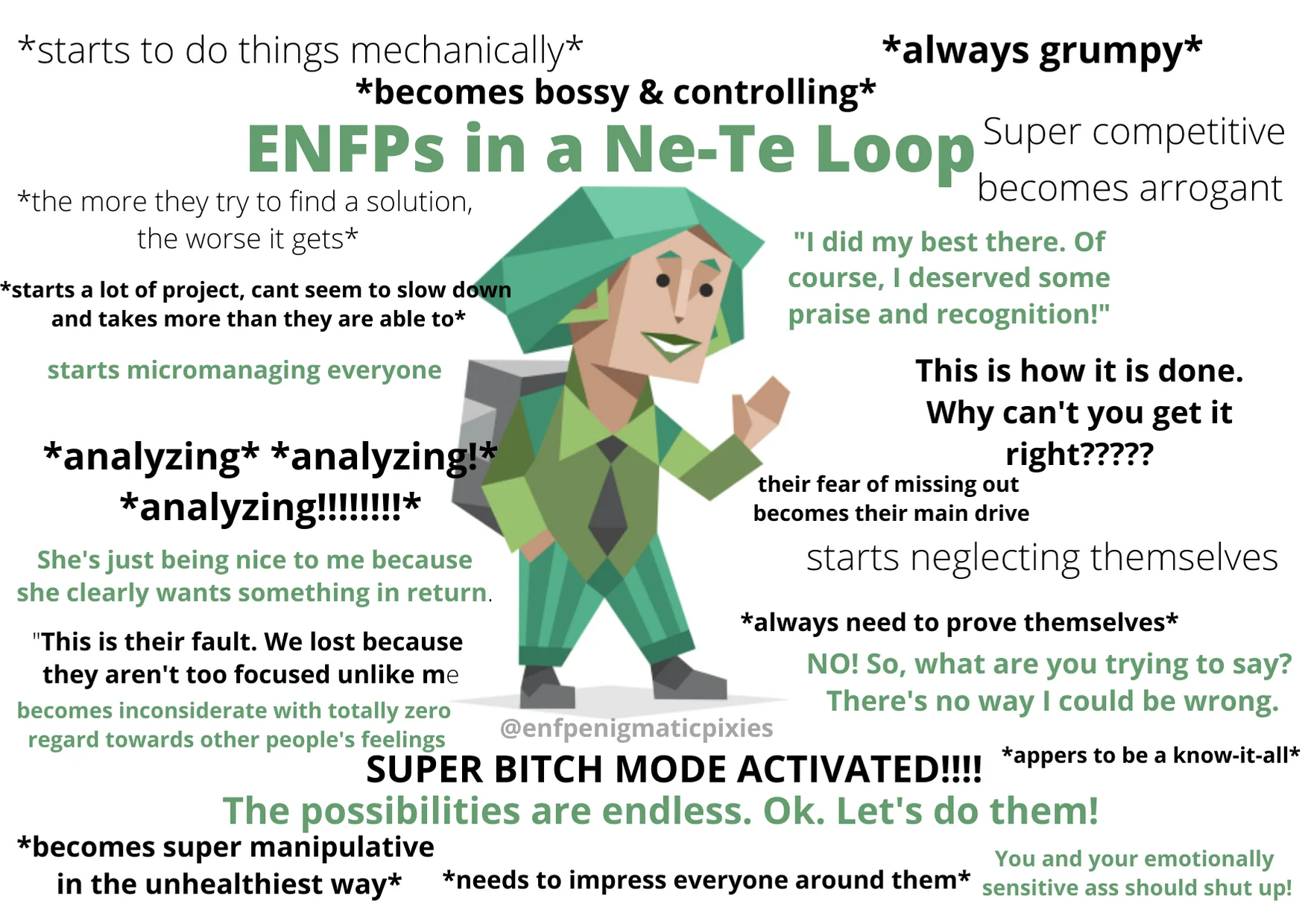Past Relationships of an ENFP Ne-Te Loop
Here is the story of an ENFP Ne-Te loop that I think it is a quite similar about my story and the valuable advices of the author about our relationships with ex girlfriend.

How can I, an INFP, help an ENFP in a loop? He’s been looping for months, it happened after his gf ended the relationship. He’s very judgmental, hates humanity, has violent fantasies towards his ex. He often talks about winning/losing, dependence/domination in his relationships, projects his feelings of dependency and weakness into his friends and is sometimes very disrespectful to them. (1/3)
[con’t: (but he isn’t always like that. (!) He can be very friendly and respectful and then suddenly change w/o a visible cause). He says he never ever felt happy for another person, that he never feels pity, never is emotionally touched by something. When I talk to him, I’m sympathetic. He is in a lot of pain and can’t see a way out. But I also tell him when his behavior is childish or low or cruel. I try to give him advice and he genuinely listens to me (and he wants to talk to me about his pain) but can’t apply it (I know it’s very difficult for a looping person). He used to be a creative, charming, sweet and very amicable and optimistic person. He did feel happy for people and he did feel pity, I know this. But now he says he feels like he can’t change because his feelings of contempt and despair are his identity. How can I help him? (we’re all in our early 20s).]
When NFs turn their pain into their identity, there’s not much you can do to help them because all of your suggestions will sound to them like you are disrespecting their individuality and that “you don’t really understand” them (therefore, they shouldn’t listen to you). It’s a difficult situation to deal with. He still hears you out and is not so far gone as to dismiss you outright, which is good. It’s good that he’s known what it’s like to be healthy. Unhealthy NFs tend to suffer self-esteem problems and are extremely sensitive to criticism, so your words should carry a tone of positivity, encouragement, and hopeful possibility. You’ve already got the empathy, make sure it comes out in everything you do and say if you don’t want him to become defensive towards you.
The way he indulges his pain is a defense mechanism (tertiary loop). Anger and vindictiveness provide the illusion of strength and control. When a person is forced into a powerless and vulnerable position (as is often the case with romantic breakups), it is natural to want to stabilize oneself by grasping for any form of power and influence. Why do you think many divorces get so nasty? For enfps, this unfortunately takes the form of Te loop, which essentially means becoming an asshole, as you’ve witnessed firsthand. But this is just a flimsy way to hide from the pain of feeling helpless and the hurt of feeling discarded. Ideally, a person should embrace their vulnerability, take the hit and face the facts of the negative event, i.e., to exercise proper self-care and graceful acceptance. When they can’t, the negative emotions remain unresolved, just left to fester, escalate, and turn into something ugly. This can be particularly difficult for men who have been socialized to believe that they are entitled to what they want and that they should never have to feel helpless and vulnerable, so their low emotional intelligence leaves them with no healthy recourse to release their negative feelings, which unfortunately promotes anger and violence as last resorts.
Issue 1: He takes the breakup much too personally, which most people are prone to do; it is the rare person who can remain on good and amicable terms with all their exes. Relationships end for a variety of complicated factors and reasons, sometimes for good reason. It seems that he doesn’t understand the real reason why this relationship had to end, which means that he still holds on to the idea that it “shouldn’t” have ended. “End” doesn’t have to equal “bad”, especially when it opens up the possibility of finding a better relationship. Being dumped feels like someone stabbed you on purpose when, actually, the person is simply realizing that it’s not the path they should be on, which automatically means that it’s not the path you should be on, either. When FPs get vindictive, it is because they believe they’ve been “wronged” and they want to even the score. This is not the right way to look at the situation because it means you’re holding on to something that’s dead, you’re wasting time and energy on something that’s dead, you’re harming yourself terribly by filling your heart with hate and spite about something that’s dead. Oftentimes, forgiveness is not even about the other person and what they did/don’t/didn’t do, it’s really about exercising self-care and not wanting to be a hateful and spiteful person.
Issue 2: He turns pain into his identity, which is easy to do when one’s identity is fluid or poorly defined as is usually the case with lack of proper auxiliary Fi development. One of the great things about being NF is that a person genuinely believes they can be whatever they imagine they can be. In the best case scenario, this means that they strive to achieve their true potential and they work towards becoming a better version of themselves. In the worst case scenario, this means that a person can get totally stuck when they can’t imagine that anything better is possible. In other words, in terms of their self-image, belief often becomes reality for NFs. With inferior Si, it is common for enfps to jump to the conclusion that “hope is false” when their ideals/dreams are proven wrong/empty by a painful setback or failure. When mired in Te loop, enfps don’t have to take responsibility for being their worst self because they are able to pin the blame on something/someone else for “making” them turn bad. But a person can only be “made” to turn bad when their moral foundation was weak to begin with (Fi). Anger feels good when you’ve convinced yourself that it’s “righteous”, and he’s thusly motivated to indulge and perpetuate it. I think he fails to accurately envision where this road really leads him and he seems willing to destroy himself to prove a moot point that only he knows and cares about, which speaks to weak Fi. By indulging the false and twisted power of cynical anger, he can convince himself that he is not bad but rather it is the world and other people who are bad and he’s “forced” to be a part of it, that he is somehow better than the gf. But the reality is that his negative behavior basically just proves that she was right to leave him, and if this ever dawns on him (though it probably won’t), it can create an even bigger blow to his self-esteem.
Whatever other people do or don’t do, if you’re truly a good person, you’ll at least always try to make good moral decisions no matter what problems and challenges you encounter in life. If you can only be a good person under certain, shifting, very conveniently defined conditions, then it’s not real, is it? This is what he doesn’t understand because of weak Fi. At the end of the day, you have the final say about what kind of person you choose to be. If you choose to be full of spite, then it is you who has chosen to close the door to everything good in yourself - it is self-sabotage. Choosing one path often means that you can’t choose another: choosing negativity means that you close the door on positivity, choosing to harp on the past means that you close the door to a better future, choosing anger means that you close the door on feeling love. He needs to understand this truth so that he can accept responsibility for his life, then he can practice self-care and move forward.
